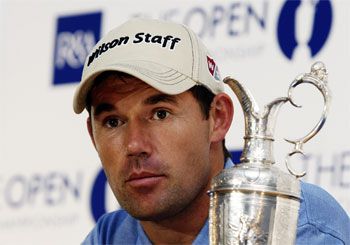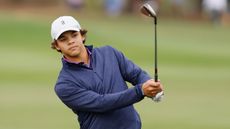Padraig Harrington on being an Open Champion
Ireland's favourite son looks back to Carnoustie

There was irony in the air over Carnoustie last summer. After eight years and 31 Majors without a European winner, here were two of our prized gladiators, Ireland s Padraig Harrington and Spain s Sergio Garcia, producing the golf of their careers in the same week. We would all have been a lot happier if they could have summoned their supreme form on different occasions one among the azaleas in April, the other among the dunes in July, perhaps but sport is rarely so accommodating.
For three days at Carnoustie the Open had belonged to Garcia. He led the field after rounds one, two and three, but come Sunday, the day of judgment, the Spaniard lost his fluidity. Ryder Cup team-mate Harrington, on the other hand, emerged from the field with his best score of the week, a four-under-par 67.
The Irishman s round should even have been a shot or two better. Standing on the final tee, he knew a par four on one of the toughest closing holes in golf would, in all likelihood, win him the Open, but in a twist reminiscent of Jean Van de Velde s collapse on the very same hole in 1999, Harrington visited the Barry Burn twice to finish with an awful double-bogey. Having posted four birdies and an eagle in a brilliant chase over the preceding 17 holes, this could have cost Harrington the Claret Jug.
But Garcia could not par Carnoustie s notorious 18th either. His 10ft putt for the Open, which seemed destined for the hole as it rolled smoothly towards the cup, cruelly lipped out, and the play-off ensued. Harrington, visibly more composed during the extra holes, birdied the first while Garcia dropped a shot, and ultimately, on their return to the 18th hole, a five was enough for Harrington to win.
Eight months later, as he was preparing himself for the Ballantine s Championship in South Korea, Harrington told Golf Monthly about a welcome diversion that arrived just a moment or two after he thought he had thrown away the Open.
What stands out as something completely unique and spontaneous from Carnoustie was the effect my son had on me at the 72nd hole, says the 36-year-old Dubliner. As I walked off that green I thought I had just lost the Open Championship, and Patrick came running onto the green and looked at me as if I had just won. It really did change my whole demeanour.
Having just messed up and taken six at the last it should have been one of the lowest points I could ever reach, but the way my son smiled was good enough for me. That look is something that could only happen between a three-year-old boy and his father. I walked off the green feeling as though I was a champion because he thought I was and that was all that counted at that moment. It was a one off and just a very, very special moment I will never forget.
Get the Golf Monthly Newsletter
Subscribe to the Golf Monthly newsletter to stay up to date with all the latest tour news, equipment news, reviews, head-to-heads and buyer’s guides from our team of experienced experts.
Perhaps this is why Harrington looked so much more poised than Garcia as the pair embarked on the nerve-jangling play-off.
Time will tell whether Garcia has the strength to recover from an emotional collision that has permanently derailed the careers of other great players in the past Tony Jacklin s loss to Lee Trevino at Muirfield in 1972 is the classic British example. Harrington can imagine how it would have felt had Garcia s putt on the 72nd green rolled just half an inch to the right.
If Sergio had parred the 72nd hole and I did lose, it would have been incredibly hard to take. I think I would have struggled to come back out and be a competitive golfer. It meant that much to me.
Carnoustie s 18th is the toughest finishing hole in golf. There is trouble everywhere and to try and win a tournament there is incredibly difficult, so I knew it was going to be tough for Sergio to make par. He hit a lovely putt though, and I thought he had holed it.
As it happened, Harrington s name shall forever remain on the base of that ancient silver jug.
In the end, the ultimate judgment of a professional golfer is whether you won a Major, he says. There is no question that when all is done and dusted, I will look back on my career, and being an Open champion will bring me a lot of joy. But it will bring me a lot more joy in the future than it does now, because as a current Open champion I need
to make sure I don t relax and enjoy the achievement too much. I am a current player and I need to keep working hard. I can t afford to feel like that s it, I have arrived, I have done it. I need to keep pushing on.
And there is Padraig Harrington in all his colours, a professional who is as unflinchingly honest as his accent is so unmistakably Irish, and someone who has always displayed deep-set determination to glean the most out of his considerable golfing ability.
Yet, if anything, Harrington s greatest fault as a Tour golfer is his occasional lack of confidence. Not only does he consider that losing the Open last year might have been a knockout punch for his whole career, but he openly admits that at the age of 21, I turned pro because the guys I was able to beat as an amateur were turning pro, not because I thought I was good enough. Hardly the words that would ever be uttered by, say, Ian Poulter, Paul Casey, Phil Mickelson, or any number of Harrington s rivals at golf s top table.
When I turned pro I hoped I would have a great life, and if I did well, I thought maybe I d make a comfortable living on the Tour. My idea was to have a couple years if I could, but I won after 10 weeks and I couldn t really believe how well I did it was fairytale stuff.
Harrington s maiden Tour victory came at the 1996 Spanish Open, and the 24-year-old went on to earn £325,343 in that rookie year, to finish 11th in the European Order of Merit. His swift progress enabled him to make his American Major debut at the 1997 US Open at Congressional, at which point he was dealt the first reality check of his Tour career.
It was just too difficult for me, he says with yet more frankness. I shot 76 and 77, missed the cut and came home thinking, I m a good golfer, but unless I do something about it I m not good enough . Then I started working with Bob Torrance, and I ve worked tirelessly to improve so I could compete on US-style courses. It s funny that winning the Open definitely drew on my instincts for playing links golf, just as I did as an amateur growing up. It s been a long road.
Now equipped with the shots and the experience to compete wherever he chooses, Harrington admits the greatest danger he faces today is over-working. At least he doesn t have to look too far for a welcome distraction and a fresh perspective when he needs it, as Patrick illustrated after his father had been presented with the Claret Jug at Carnoustie. His face lit by the gleaming silver, Patrick asked if they could put ladybirds in the jug. Yes, we can, replied his dad. We ll put ladybirds in it. What a great idea.
Padraig s Open: Round by Round
ROUND 1, 69, TWO UNDER PAR
After a dropped shot at the second, Harrington fought back with birdies at 9, 13 and 14 to finish four behind Garcia s lead.
ROUND 2, 73, TWO OVER PAR
A steady round in the wind until a double-bogey at 18. He finished six shots off the lead.
ROUND 3, 68, THREE UNDER PAR
Three birdies in the first six holes saw Harrington rise to third place, although he remained six shots adrift.
ROUND 4, 67, FOUR UNDER PAR
A magnificent round until the 18th. Four birdies were followed by an eagle on 14.
You know what happened at the last.
TOTAL 277, SEVEN UNDER PAR
PLAY-OFF, HOLES 1, 16, 17, 18, LEVEL PAR
While Harrington birdied the first, Garcia missed the green and dropped a shot to fall two behind. Harrington took a cautious-but-dry 5 on 18 to win by one.
Robin has worked for Golf Monthly for over a decade.
-
 Watch Rickie Fowler Make Hole-In-One On Buddies Trip With Justin Thomas To Pine Valley
Watch Rickie Fowler Make Hole-In-One On Buddies Trip With Justin Thomas To Pine ValleyRickie Fowler made the ace in the company of his close friend on the downhill par-3 third at the ultra-private course in New Jersey
By Ben Fleming Published
-
 Charlie Woods Shoots 81 To Fall Short In Bid To Qualify For 2024 US Open
Charlie Woods Shoots 81 To Fall Short In Bid To Qualify For 2024 US OpenCharlie Woods carded a nine-over-par round in local qualifying to miss out on one of five spots into final qualifying
By Ben Fleming Published